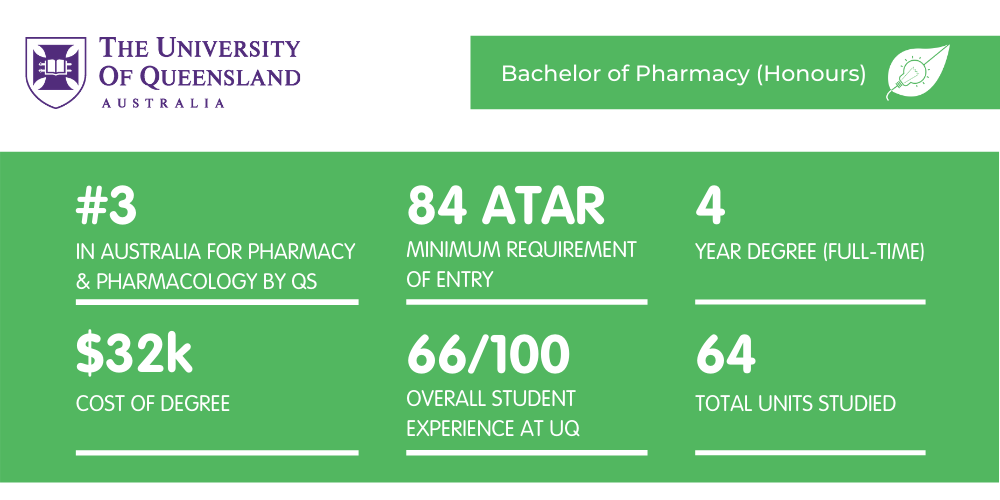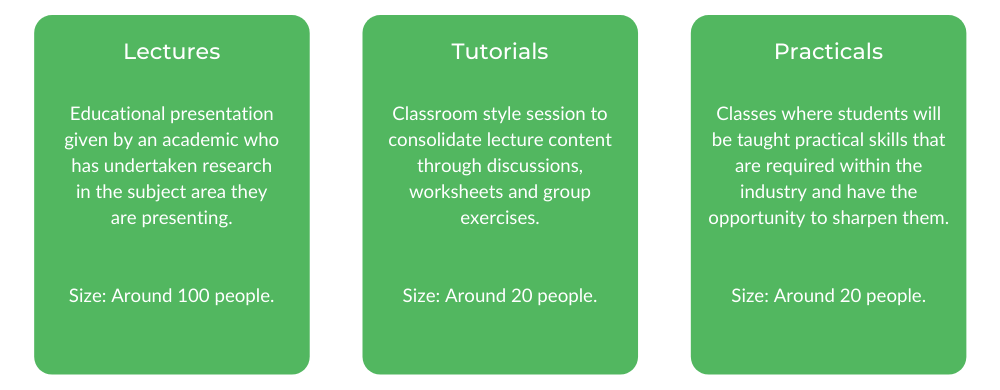Perhaps, your favourite subjects are biology and chemistry, and you’re looking for a science-related career or you want to learn more about the science behind medication. You might even want to help clients in finding treatments — studying Pharmacy at UQ is a great option for those reasons and more!
In this article, we’ll be sharing what it’s like studying a Bachelor of Pharmacy (Honours) at UQ from the core units, clinical practices to assessments and university culture.
Keen to know more? Just read on!
What is a Bachelor of Pharmacy (Honours) at UQ?
Core Units and Majors
How to Get into a Bachelor of Pharmacy (Honours) at UQ
What’s the Teaching Format?
What’s the Faculty and Culture Like?
What is a Bachelor of Pharmacy (Honours) at UQ?
A Bachelor of Pharmacy (Honours) at the University of Queensland is a four-year full-time degree where students learn the biology, chemistry, physiology and pharmacology that underpin aspects of medicines and the ailments for which they treat, cure and aid. Think designing and discovering dosage forms, as well as the professional side of pharmacy.
The program teaches a great mix of skills from theory, practice and research through a combination of university classes and work placements. These university classes take place in state-of-the-art laboratories and simulated pharmacies in UQ’S Pharmacy Australia Centre of Excellence (PACE) — a $100m facility based at the Princess Alexandra Hospital that is dedicated to Pharmacy students.
While this degree cannot be studied as a double degree, all students graduate with an Honours, which is integrated into the course program.
Career Pathways
Graduates of a Bachelor of Pharmacy (Honours) at the University of Queensland can enter various pathways within the pharmacy profession, which include industry, clinical and research. Some options include:
-
- Retail pharmacist
- Medical researcher
- Toxicologist
- Hospital/dispensary pharmacist
- Clinical trials officer
Core Units and Majors
All units in a Bachelor of Pharmacy (Honours) at the University of Queensland are core units until the fourth year of the program.
In the fourth year, students with a GPA of 5.0/7.0 (calculated up to the first semester of the third year) are eligible to further specialise in the Clinical and Experimental Therapeutics major. Since this major is for students who want to pursue a career in research, students can choose to opt out of the major and continue without this specialisation.
First Year
The first year are all introductory units to foundational scientific concepts in pharmacy. These include biology in Genes, Cells and Evolution, inorganic and organic chemistry in Chemistry for Pharmacy and Physiology, and body systems in Integrated Anatomy and Physiology.
Professional practices such as pharmaceutical calculations, introduction to prescription medicines and drug delivery are also taught in Introductory Pharmacy 1 and Pharmacy – Data Analysis & Professional Practice.
Second Year
The second year explores different uses of pharmacy in industry, research and clinical practice. Dosage Form Design A1 and Dosage Form Design A2 focus on the industry designing of liquid, semi-solid and solid dosage forms using biotechnology principles.
The units Drug Discovery A1 and Drug Discovery A2 offer essential knowledge to research projects, wherein medicinal chemistry and quantitative analysis of drugs are taught. Quality Use of Medicines A1 and A2 offer contemporary practice approaches in information retrieval, effective use of resources and patient-centred care.
Third Year
The core units in third year are all intermediate units from the second year. For example, Dosage Form Design B1 extends from designing dosage forms to understanding principles in its optimisation as well as external factors such as drug transport and delivery.
Fourth Year
In their fourth year, non-specialisation students focus on their clinical practice skills through patient simulations in Integrated Patient Centred Care 1 and 2 and real-world practice and research placements.
Instead of two practice placements, Clinical and Experimental Therapeutics students work on a two-semester-long Independent Research Project and undertake one practice placement.
Work Placements
For non-specialisation Pharmacy students, two 4-week block placements are undertaken in their fourth year. For Clinical and Experimental Therapeutics Pharmacy students, there is one 4-week placement undertaken.
How to Get into a Bachelor of Pharmacy (Honours) at UQ
The ATAR cut-off for a Bachelor of Advanced Business (Honours) at UQ is 84 for guaranteed entry.
Alternate Pathways
If your ATAR does not meet the cut-off, there are a couple of alternatives. The Subject Incentive Scheme offers up to 5 adjustment points if you have studied and achieved a grade of C or higher in Specialist Mathematics or a Language other than English.
In addition, current university students (especially with a background in Science) can internally or externally transfer into Year 2 of the Bachelor of Pharmacy (Honours).
Prerequisites
The prerequisite subjects for this program are:
-
- Queensland Year 12 (or equivalent) General English subject (Units 3 & 4, C)
- General Mathematics, Mathematical Methods or Specialist Mathematics (Units 3 & 4, C)
- Chemistry (Units 3 & 4, C)
Biology is also a recommended subject. There are no additional assessments to entry.
Scholarships
While being granted a scholarship can be a great source of financial assistance and addition to your CV, there are not many available scholarships for Pharmacy students. The most relevant scholarship is UQ Link Scholarship, which is eligible for students who have experienced educational disadvantage due to financial hardship, where the recipient is awarded $3,000 per year for up to 3 years.
What’s the Teaching Format?
A Bachelor of Pharmacy (Honours) at UQ is delivered across semesters. The main class formats are lectures, tutorials and practicals.
Class Structure
Lectures
Lectures are usually provided to all students in cohort and are held in the auditoriums at the Pharmacy Australia Centre of Excellence (‘PACE’).
Lectures cover biology, chemistry, physiology and pharmacology underpinning key aspects of medicines and the diseases/ailments for which they treat, cure or aid. They often run for 50-minutes (sometimes back to back with different units) and while these lectures are mainly online, on-campus lectures often have a class size of 100 students.
Tutorials
Tutorials focus on clinical practice and skills such as dispensing and counselling on medicines. The PACE tutorial rooms are equipped with “mock pharmacies” that aim to stimulate real-world environments that students might encounter. Tutorials are typically one hour long and have a class size of 20 students.
Practicals
Practicals encompass the research and design components of pharmacy. These practicals involve compounding medicines such as creams, tablets, capsules and suspensions.
In addition, students perform experimental and analytical investigations with real-world equipment and proper techniques. Practicals are usually 3 hours long with a class size of 20 students.
How much time do you spend in class?
The average contact hours for a Bachelor of Pharmacy (Honours) at UQ is 15-20 hours per week.
What are the assessments like?
The main assessments in this program are quizzes, practical tasks and exams. The variety of assessments help to make learning more enjoyable and flexible for every students’ own pace!
In the first year of the degree, subjects are foundational and usually consist of a mid-semester exam (25%), end of semester exam (35%) and assignments and quizzes making up the rest of assessments.
In Years 3 to 4 of the Bachelor of Pharmacy degree, most subjects of the degree have mid-semester and end of semester exams, generally worth 15% and 35% respectively.
The rest of your marks stem from assignments, which are usually one or two 15-30% assessments and weekly/fortnightly quizzes worth 2.5-5% each quiz. Larger assessments can include simulated oral consultation, written reports and group presentations.
Skills That You Refine and Learn
Pharmacy graduates learn and refine three main skills, which are clinical, analytical and communication.
These clinical skills are taught through on-campus “mock” consultations, professional pharmaceutical units and work placements.
Analytical skills are also developed in the research and design units, where pharmaceutical calculations, design of dosages and compounding of drugs require applying theoretical scientific knowledge to the identification and solving of various problems.
Lastly, communication skills are developed in a clinical practice and written contexts through report writing, presentations as well as real and mock consultations.
What’s the Faculty and Culture Like?
Faculty
The UQ Pharmacy faculty is very advanced in providing all necessary resources to their students. The Pharmacy Australia Centre of Excellence (PACE) is a $100m facility is dedicated to Pharmacy students and is even complete with its own library!
The program is also taught by a variety of lecturers and tutors, who simultaneously work in community, hospital, industry, academia and business.
While the majority of Pharmacy students come from Brisbane, there is also a large portion of international students from China, Singapore, Canada and America. The diverse mix of cultures ensure that the Bachelor of Pharmacy is a multicultural and inclusive community, and students get to hone their intercultural communication skills by working with others!
Societies
While there are over 220 societies at UQ, one society Pharmacy students should all join is the Queensland Pharmacy Students’ Association (‘QPSA’). The society keeps its Pharmacy members up to date with career events, social hangouts and anything in-between such as the annual Red Day, which promotes blood donations with the Red Cross Lifeblood service.
If you want to venture outside of the Pharmacy cohort, the UQ Music Society offers a great creative and interdisciplinary space to meet new friends through pub crawls and Coffee & Career days that feature talks with creative industry guests!
Support Programs
To help all their students excel, PASS sessions are offered and integrated in almost all Pharmacy units!
In addition, UQ offers mentoring programs for first-semester students to ease the transition from school to university life. Throughout the semesters, there are also study skills workshops that offer general study guidance for students.
Keen to learn about the pros and cons of Pharmacy at UQ? Check out our article here!
Lynn Chen is a Content Writer at Art of Smart Education and is a Communication student at UTS with a major in Creative Writing. Lynn’s articles have been published in Vertigo, The Comma, and Shut Up and Go. In her spare time, she also writes poetry.






